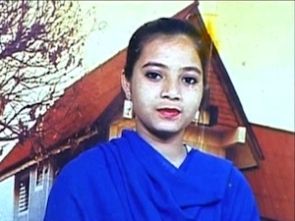 Rediff.com’s Vicky Nanjappa takes a fresh look at the Ishrat Jahan encounter case in light of the CBI filing its charge sheet.
Rediff.com’s Vicky Nanjappa takes a fresh look at the Ishrat Jahan encounter case in light of the CBI filing its charge sheet.
The Central Bureau of Investigation filed its first charge sheet in the Ishrat Jahan case on Wednesday and the salient point that the agency made was the encounter was staged or fake.
The CBI says that it would file an additional charge sheet in a month’s time bringing out more names the involved persons, but it may remain silent on a key factor and that is whether Ishrat and her three other accomplices were Lashkar-e-Tayiba operatives or not.
Although the CBI states that it would go into this aspect as well, it appears unlikely that it would do so, since it does not have that brief from the Gujarat high court.
The other missing crucial aspect to the charge sheet is the motive behind the encounter, which the CBI claims is fake. Although this point may not even come up, sources tell rediff.com that it had become a case of over-enthusiasm by the Gujarat police.
Several years back, the Gujarat police had started to play a proactive role in dealing with terrorism. Very often, the administration had accused the Congress-ruled states of not acting against terror and soft peddling on the issue. The Gujarat police were seen literally all over the country probing or helping probe terror-related cases.
The classic case was in Andhra Pradesh where it assisted the police of that state crack down on some local elements. The Haren Pandya murder and the Sohrabbudin Sheikh encounter cases had a Gujarat angle to it.
These sorts of incidents even led to several locals in Hyderabad saying, “Gujarat police is the Andhra Pradesh police.”
The Gujarat administration was very clear that it would not tolerate any terror activities. So, the police had a lot support dealing with such activities. Some officers were a bit too enthusiastic about pleasing the administration, and this led to operations which were not carried out as they ought to have been. This is what could have happened in the Ishrat Jahan case, CBI sources point out.
Former Chief of the Research and Analysis Wing, C D Sahay explains that the CBI would not investigate the Lashkar angle. “This is only because they have no such directive from the high court,” he says.
Sahay, however, while explaining how encounters ought to be carried out, says, “We follow the British system, and in many cases, it appears as though police officials have gone the American Federal Bureau of Investigation way which is clear -- first shoot, and then talk.”
“There is a procedure involved. First a trap needs to be laid and then the target is neutralised. Officers need to identify the accused first, give an opportunity to speak and seek identification. In case guns are drawn, they have the permission to shoot,” he says.
“It is a different matter in Jammu and Kashmir where the army or police deals with Pakistan nationals. That is more of a war zone, and such a procedure cannot be followed, as those persons are sent to kill,” he adds.
Moreover, in cases which are sought to be mobilised based on an alert, Sahay says that there needs to be a lot of consultation and coordination with the intelligence agencies.






 © 2025
© 2025